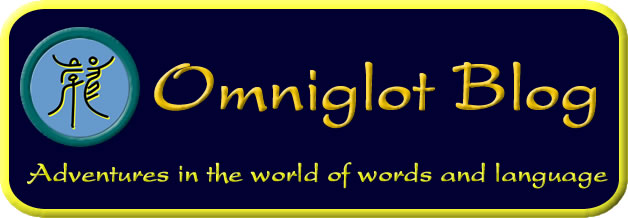Yesterday I added two new language pages to Omniglot Nanggu (an Oceanic language spoken in the Solomon Islands) and Uneapa (an Oceanic language spoken in Papua New Guinea). Why do I mention this? Well, Uneapa happens to be the 2,000th language on Omniglot, and I thought that’s something to celebrate.

When I started Omniglot back in 1998, it was just a little site to promote a web design and translation business I tried to set up. I added information about languages I knew and could work with, and then starting adding details of alphabets and other writing systems, and the languages written with them.
Since then, the site has grown a bit and now has some 7,600 pages, with details of 345 writing sytems, 900+ constructed and adapted scripts, 2,000 languages, useful phrases in 362 languages, numbers in 1,081 languages, and much more.
Here are some significant moments from the past 26 years:
1998 – Omniglot begins
1999 – I started working as a web developer specialising in multilingual websites in Brighton (& Hove). I continued to work on Omniglot in my spare time while I was there.
2000 – Omniglot.com registered as a domain
2003 – Revenue from Omniglot starts to trickle in, mainly from commission on Amazon sales
2004 – visitor numbers to Omniglot reached 100,000 per month
2005 – I went to Donegal in the northwest of Ireland to study Irish language and songs for the first time. I went there for a week or two every summer until 2019.

2006 – Omniglot blog launched. My first post, after a welcome one, was about Language and memory. Since then, I have written 3,767 more posts, including this one.
2007 – I launched the Omniglot YouTube channel. My first video was a silly little conversation in French and English about flying monkeys and other strange things. Since then, I’ve posted another 239 videos.
2008 – I was made redundant from my job in Brighton and started working on Omniglot full-time, while doing a bit of freelance work for other websites. I also registered Omniglot as a limited company.
2008-2009 – I moved to Bangor in north Wales to do an MA in Linguistics at Bangor University. I’ve been here ever since.
2010 – I bought a house in Bangor after renting for a couple of years.
2011 – visitor numbers to Omniglot reached 1 million per month.
2012 – I started writing songs, inspired by a poetry writing workshop I went to in Bangor, and by a singing class I started attending in 2010. Since January 2019, I’ve written at least one new song every month. Here’s the first song I wrote:
2014 – I went to the Polyglot Gathering in Berlin, and to the Polyglot Conference in Novi Sad, Serbia. They were my first large polyglot events I’d attended, and I thoroughly enjoyed them. Since then, I’ve been to quite a few others in Europe and North America.
2015 – visitor numbers reached 2 million per month. I also started writing tunes this year. I think this is the first tune I wrote, played by me on the harp:
2016 – peak year so far in terms of visitor numbers and revenue from Omniglot. Thanks to my frugal habits, savings and income from my site, I was able to pay off my mortgage in full this year.
2017 – I started studying languages on Duolingo every day while recovering from a little ice skating accident involving a broken ankle, and have continued to do so ever since. My current streak is at 2,481 days today. So far I’ve studied Russian, Romanian, Czech, Swedish, Danish, Dutch, Esperanto, Spanish, Finnish, Japanese, Scottish Gaelic and Irish. I had some knowledge of most of them before, but Romanian, Danish and Finnish were completely new to me. I wouldn’t claim to speak any of them fluently or flawlessly, but I can at least have conversations in them.
2018 – I started Celtiadur, a blog where I explore connections between Celtic languages. My first post was about words for Big, Large & Great and related things. Since then, I have written 419 more posts, and have been working to improve the earlier posts, which tended to be quite basic.
This blog, under a different name, had previously been about my language learning efforts and travels, but I moved the old posts to my main Omniglot blog, decided to focus on Celtic languages instead.
I also started the Radio Omniglot blog and podcast. Episode 1 was about My Language Learning Adventures. Since then, I have written and recorded 381 more posts and podcasts.
2021 – I added the 1,500th language (Akawaio) to Omniglot.
2021 / 2022 – I had a home office / studio built in my garden. Since then, it’s been the place where I do most of my work, and make podcasts and other recordings.
2024 – I added the 2,000th language (Uneapa) to Omniglot.




Llongyfarchiadau!!! Geweldig werk! 🍀
Congratulations!
By the way, I lover the Pan-Caucasian alphabet you posted last week.
I made contact with the author on Academedia.
I will make a compitation of all known characters some time in the future
(there are more than you have on Omniglot).
Congratulations! It was interesting to read about your journey with Omniglot.
Hello Simon,
I am very pleased to see you announcing this new milestone. I thought 1,500 was a big deal, and I remember when you announced that. I am grateful I have been able to be of assistance to you, and I will continue to do that as long as I am able. You have accomplished so much, it’s really amazing.